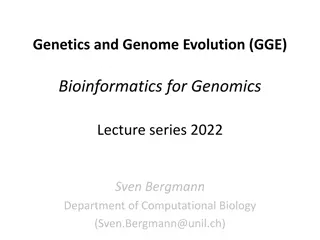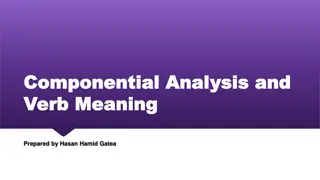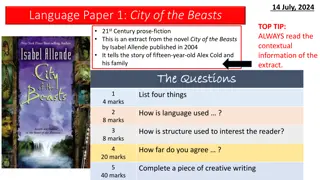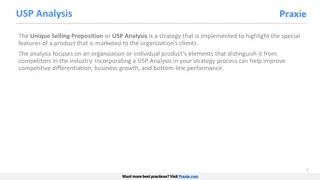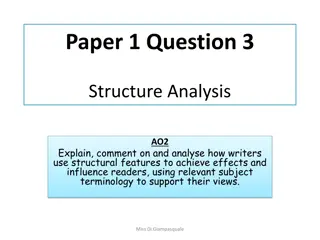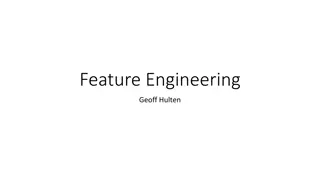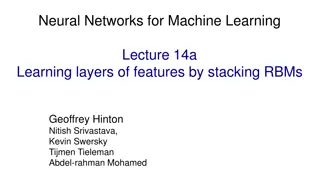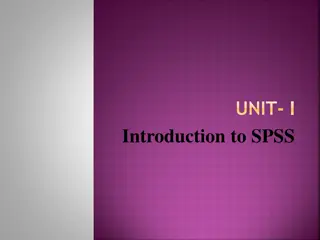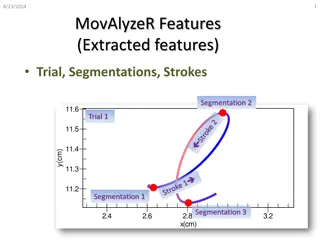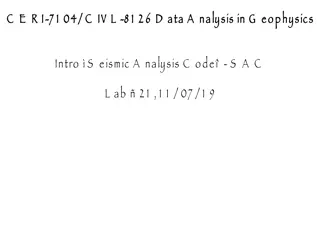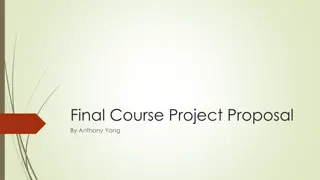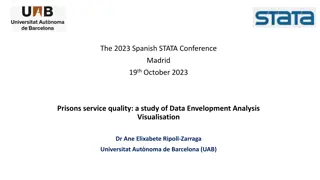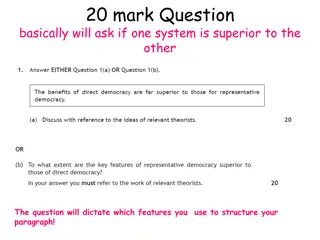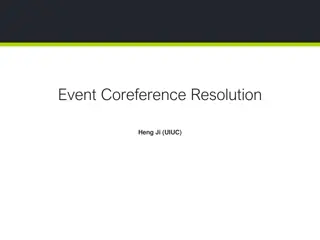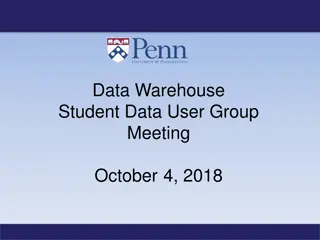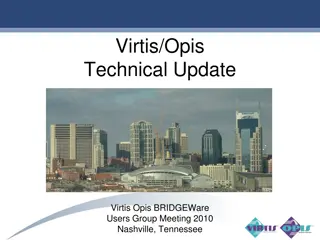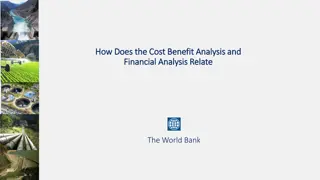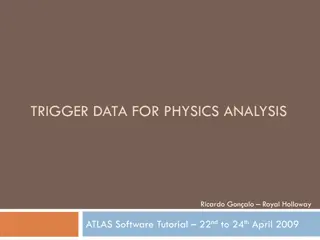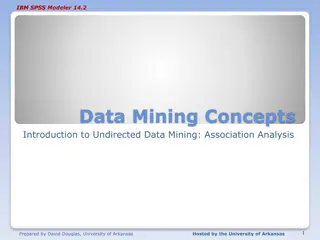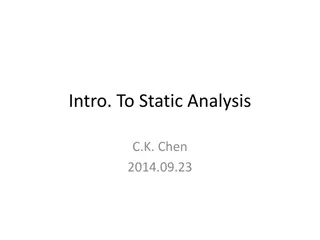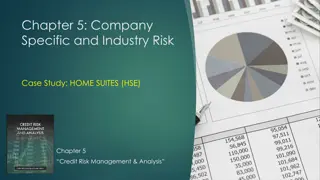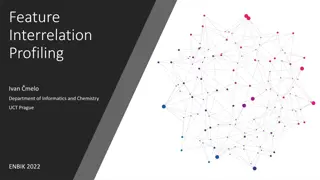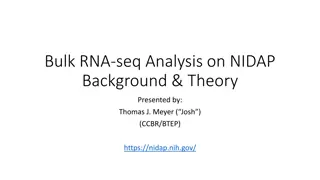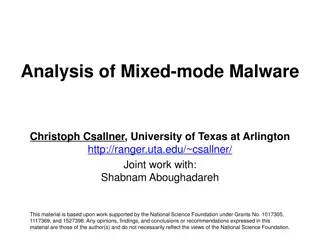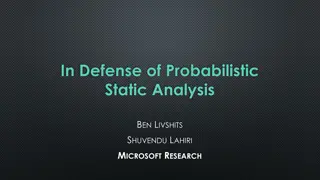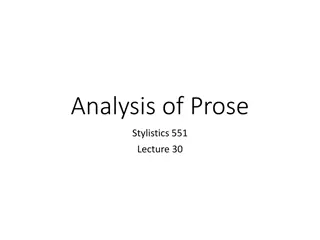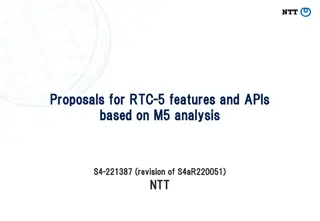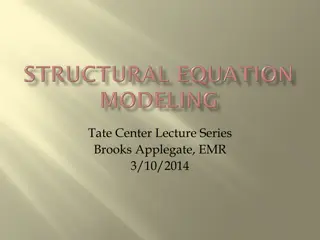Algorithm Analysis
Algorithm analysis involves evaluating the efficiency of algorithms through measures such as time and memory complexity. This analysis helps in comparing different algorithms, understanding how time scales with input size, and predicting performance as input size approaches infinity. Scaling analysi
1 views • 30 slides
Market Analysis (Project Formulation)
This detailed guide covers essential aspects of market analysis and project formulation in entrepreneurship, including feasibility analysis, techno-economic analysis, market demand analysis, steps in market analysis, and factors to consider for market demand analysis. Explore how to assess market de
2 views • 30 slides
Static Analysis Techniques Overview
Explore static analysis techniques such as syntactic analysis, dataflow analysis, and model checking. Understand the concept of basic blocks in static analysis and their boundaries. Dive into the opportunities provided by static analysis in summarizing program behavior without executing it.
9 views • 27 slides
Bioinformatics for Genomics Lecture Series 2022 Overview
Delve into the Genetics and Genome Evolution (GGE) Bioinformatics for Genomics Lecture Series 2022 presented by Sven Bergmann. Explore topics like RNA-seq, differential expression analysis, clustering, gene expression data analysis, epigenetic data analysis, integrative analysis, CHIP-seq, HiC data,
0 views • 36 slides
Understanding Componential Analysis in Semantics
Componential analysis is a significant theory that emerged in the 20th century to analyze words based on semantic features. It helps identify word meanings by examining components and their features. This method involves representing features as either positive (+), negative (-), or unspecified (.).
0 views • 22 slides
Comprehensive Cost Management Training Objectives
This detailed training agenda outlines a comprehensive program focusing on cost management, including an overview of cost management importance, cost object definition, cost assignment, analysis, and reporting. It covers topics such as understanding cost models, cost allocations, various types of an
2 views • 41 slides
Analyzing Structural Features in "City of the Beasts
Explore the use of structural features in the novel "City of the Beasts" by Isabel Allende through an in-depth analysis of the text's organization and how it captivates readers. Understand how the writer shifts focus, introduces key elements, and maintains reader engagement. This analysis aims to un
0 views • 10 slides
Qualitative Data Analysis Techniques in Research
The purpose of data analysis is to organize, structure, and derive meaning from research data. Qualitative analysis involves insight, creativity, and hard work. Researchers play a crucial role as instruments for data analysis, exploring and reflecting on interview discussions. Steps include transcri
1 views • 27 slides
Enhance Marketing Strategies with USP Analysis
USP Analysis, focusing on highlighting unique product features to stand out from competitors, is essential for business growth and competitive differentiation. By incorporating USP Analysis into your strategy, you can improve bottom-line performance. Create a USP chart comparing your company and com
0 views • 4 slides
Structural Analysis: The Woman in Black by Susan Hill
In this structural analysis, key subject terminology and structural features are explored to understand how writers use these elements to achieve effects and influence readers. The focus is on a specific extract from The Woman in Black by Susan Hill, analyzing how the author utilizes structural feat
0 views • 8 slides
Understanding Feature Engineering in Machine Learning
Feature engineering involves transforming raw data into meaningful features to improve the performance of machine learning models. This process includes selecting, iterating, and improving features, converting context to input for learning algorithms, and balancing the complexity of features, concep
0 views • 28 slides
Understanding Stacked RBMs for Deep Learning
Explore the concept of stacking Restricted Boltzmann Machines (RBMs) to learn hierarchical features in deep neural networks. By training layers of features directly from pixels and iteratively learning features of features, we can enhance the variational lower bound on log probability of generating
0 views • 39 slides
Understanding IBM SPSS for Statistical Analysis
IBM SPSS, formerly known as Statistical Package for the Social Sciences, is a powerful software package for statistical analysis used by researchers across various industries. Developed in the late 1960s, SPSS offers features for data management, statistical analysis, and data documentation. It simp
1 views • 13 slides
Analysis of Dynamic and Static Features in MovAlyzeR
This document details the features extracted from MovAlyzeR trials, including stroke, segmentations, pressure, jerk, and size measurements. It covers static shape features such as slant, straightness error, and loop surface between strokes. The analysis includes dynamic features related to position,
0 views • 12 slides
Introduction to Data Analysis in Geophysics with Seismic Analysis Code - SAC Lab 2.1
Explore the world of geophysics data analysis using the SAC Lab 2.1 code. Learn about seismic analysis, Fourier transform analysis, spectral analysis, color tracing, integration, differentiation, and more. The SAC online documentation provides valuable resources for users to delve deeper into this f
0 views • 45 slides
Data Analysis and Passage Analysis Project Proposal
This project proposal by Anthony Yang focuses on developing a Java program for data analysis and passage analysis. The motivation behind the project is to gain more knowledge in computer science and statistics-related topics while utilizing technology to extract useful insights from data. The propos
0 views • 8 slides
Efficiency Methodological Approaches in Prisons Service Quality Study
Exploring efficiency methodologies in analyzing prisons service quality, this study focuses on parametric and non-parametric approaches such as Data Envelopment Analysis (DEA) and Stochastic Frontier Analysis (SFA). It delves into benchmarking techniques, productivity analysis, and the implications
0 views • 21 slides
Comparative Analysis of RTOS Features and Tools for MSP432 MCU
This comprehensive comparison delves into the features and options available for real-time operating systems (RTOS) on MSP432 MCU, covering tasks, middleware, connectivity, power management, drivers, sensors, and more. The analysis also includes a detailed comparison of RTOS tools, viewers, executio
0 views • 17 slides
Analysis of Direct Democracy vs. Representative Democracy Features
In this academic guide, the focus is on analyzing and comparing key features between direct democracy and representative democracy. The essay structure, paragraph breakdown, and example paragraphs provided offer a framework to evaluate the strengths and weaknesses of each democratic system. Through
0 views • 8 slides
Event Coreference Resolution Task and Features Analysis
Event Coreference Resolution Task involves analyzing various events, such as explosions and bombings, to determine connections and resolve references. Features include event type, triggers, similarities, distances between events, argument overlaps, and more. Incorporating event attributes as feature
0 views • 31 slides
Data Warehouse Student Data Users Group Meeting Highlights
In the data warehouse student data users group meeting on October 4, 2018, various topics were discussed including upgrades to Business Objects, new features in BI4.2, curriculum management data collection, student records, financial aid, and development schedules. The meeting highlighted the abilit
0 views • 14 slides
Virtis/Opis Technical Updates and Releases Over the Years
Explore the evolution of Virtis/Opis software through various releases starting from Opis R/C Superstructure LRFD Analysis in 6.0 release to the addition of new features and enhancements in subsequent versions like the Superstructure Wizard Analysis Control Settings and Diaphragm Wizard in the fall
0 views • 32 slides
Understanding the Relationship Between Cost Benefit Analysis and Financial Analysis
The intersection of cost benefit analysis and financial analysis is crucial for evaluating projects, with economic analysis focusing on incremental benefits and costs while financial analysis ensures sustainability. Perspectives like those of the government, utility manager, and private lender shape
0 views • 8 slides
Understanding Trigger Data Analysis in Physics: ATLAS Software Tutorial
This content provides detailed information on trigger data analysis for physics, focusing on ATLAS software tutorials conducted by Ricardo Gonçalo at Royal Holloway in April 2009. It covers features extraction algorithms, trigger configuration and data management, trigger-aware analysis, and the Tr
0 views • 26 slides
Introduction to IBM SPSS Modeler: Association Analysis and Market Basket Analysis
Understanding Association Analysis in IBM SPSS Modeler 14.2, also known as Affinity Analysis or Market Basket Analysis. Learn about identifying patterns in data without specific targets, exploring data mining in an unsupervised manner. Discover the uses of Association Rules, including insights into
0 views • 18 slides
Introduction to Static Analysis in C.K. Chen's Presentation
Explore the fundamentals of static analysis in C.K. Chen's presentation, covering topics such as common tools in Linux, disassembly, reverse assembly, and tips for static analysis. Discover how static analysis can be used to analyze malware without execution and learn about the information that can
0 views • 54 slides
Understanding Transactional Analysis in Human Relationships
Transactional Analysis (TA) is a method developed by Eric Berne to analyze communication between individuals. It helps in understanding human relationships by categorizing interactions into different ego states like ID, Ego, and Super-Ego. TA provides valuable insights into personalities, aids in re
0 views • 52 slides
Comprehensive Credit Analysis Process for Risk Management
Explore the credit analysis process for effective risk management, covering aspects such as requested amounts, profitability analysis, collateral analysis, industry analysis, and both quantitative and qualitative analyses. Learn about the key parameters considered in establishing internal ratings an
0 views • 45 slides
Industrial, Microbiological & Biochemical Analysis - Course Overview by Dr. Anant B. Kanagare
Dr. Anant B. Kanagare, an Assistant Professor at Deogiri College, Aurangabad, presents a comprehensive course on Industrial, Microbiological, and Biochemical Analysis (Course Code ACH502). The course covers topics such as Industrial Analysis, Microbiological Analysis, and Biochemical Analysis. Dr. K
0 views • 16 slides
Understanding Features of Graphic Novels through Analysis and Discussion
Explore the linguistic and visual features of graphic novels like "Persepolis" by discussing elements such as capitalization, multiple perspectives, paralinguistic features, and more. Analyze different narrative techniques, including dialogue, use of color, and differentiation between thoughts and s
0 views • 17 slides
Understanding Cheminformatic Feature Interrelations and Their Conceptual Parallels
Cheminformatic models often rely on individual features like Natural Product Likeness (NPScore) and Structural Features to assess compounds. This study explores how certain features impact scoring and the implications of "good" features in "bad" combinations. It also draws parallels in other fields
0 views • 22 slides
Bulk RNA-seq Analysis: Basics and Downstream Insights
Bulk RNA-seq is a powerful method for analyzing gene expression in biological samples. This approach involves extracting and sequencing RNA to understand the presence and quantity of RNA molecules. The process includes steps like conversion to cDNA, sequencing reads, and downstream analysis over ann
1 views • 12 slides
Essential Rules and Tips for Creating Quality Maps
Understanding what a map is, the rules of mapping, key features that should be included on maps (BOLTS), and essential tips for creating tasteful and easy-to-read maps. Guidelines include labeling in pencil first, horizontal labeling for human features, following natural directions for physical feat
0 views • 14 slides
Analysis of Mixed-Mode Malware and Malware Analysis Tools
This analysis delves into mixed-mode malware, detailing its two phases and potential impact on malware analysis tools like TEMU. It explores scenarios where malware attacks analysis tools, emphasizing the challenges faced in observing and preventing malicious behavior. The study also highlights vari
0 views • 14 slides
Benefits of Probabilistic Static Analysis for Improving Program Analysis
Probabilistic static analysis offers a novel approach to enhancing the accuracy and usefulness of program analysis results. By introducing probabilistic treatment in static analysis, uncertainties and imprecisions can be addressed, leading to more interpretable and actionable outcomes. This methodol
0 views • 11 slides
Advanced AI Facial Recognition System with Turnstile Features
A comprehensive overview of the advanced AI facial recognition system - AIFACE-MARS, showcasing its unique features such as visible light facial recognition, anti-spoofing algorithms, multiple verification methods, hardware specifications, and integrated one-way bridge tripod turnstile features. The
0 views • 9 slides
Understanding Stylistic Analysis in Literature
Stylistic analysis in literature involves examining linguistic features like lexis, grammar, foregrounded elements, and context to distinguish between literary and non-literary prose. While poetry allows for whole text analysis due to its brevity, prose analysis often focuses on selected extracts fo
0 views • 16 slides
Introducing Conga 3.0: The Web Stack of the Future
Explore the cutting-edge features of Conga 3.0, the latest web stack that promises improved scalability, new threading model, secure features, and the ability to transmit files efficiently. With new features like enhanced threading capabilities, scalability improvements, and the option to run withou
0 views • 22 slides
Essential Features of RTC-5 Based on M5 Analysis
This document delves into the essential features of RTC-5 derived from an analysis of the existing 5GMS M5 interface. It highlights the need for clarity in RTC-5 features to avoid overlapping functionalities with WebRTC signaling, proposing updates to API descriptions to enhance understanding.
0 views • 10 slides
Understanding Latent Variable Modeling in Statistical Analysis
Latent Variable Modeling, including Factor Analysis and Path Analysis, plays a crucial role in statistical analysis to uncover hidden relationships and causal effects among observed variables. This method involves exploring covariances, partitioning variances, and estimating causal versus non-causal
0 views • 59 slides



